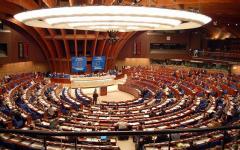 The Parliamentary Assembly of the Council of Europe should decide tomorrow on whether to support European integration of Serbia, according to Radio Deutche Welle.
The Parliamentary Assembly of the Council of Europe should decide tomorrow on whether to support European integration of Serbia, according to Radio Deutche Welle.
The Council of Europe’s Parliamentary Assembly is scheduled for tomorrow, and up for discussion will be whether or not to adopt certain resolutions and recommendations that aim to support Serbia’s integration into Europe. According to Deutche Welle, DW, with these resolutions the Council of Europe wants to send a signal to political leaders in Serbia that they are expected to cooperate between themselves and with international institutions on improving the stability and development of Serbia in the Balkan region.
The Council of Europe’s Monitoring commission will present its report on the situation in Serbia from March 2008 to March 2009. The report says that Serbia has made significant improvement since it became a member of Council of Europe in 2003. It has pointed out that in the elections of May 2008, Serbian citizens clearly gave support for European integration for the country. “Now, it is expected that Government in Belgrade will make more concrete moves in order to give the citizens a chance for a better life”, the report says according to DW.
In the report of the Monitoring Commission, the Serbian opposition is requested to decease from the Parliamentary blockade, while the ruling majority should try to build a constructive relationship and open dialogue with the opposition in order to continue the national reforms necessary for integration. The evaluation of Serbia’s cooperation with Hague Tribunal is evaluated as positive thus far, but the Government should make more effort by extraditing Hague fugitives Ratko Mladic and Goran Karadzic.
The Parliamentary Assembly of Council of Europe made a draft resolution in which the Council of Europe supported the fact that Serbia uses only diplomatic and peaceful avenues in order to protest its position on Kosovo.
In it’s draft, the Assembly also invited European institutions to improve already existing programmes of aid for Serbia, by working together with Serbian officials on improving democratic institutions, and helping their efforts in the area of human rights, and especially in their fight against organized crime and corruption.
 Eurasia Press & News
Eurasia Press & News



